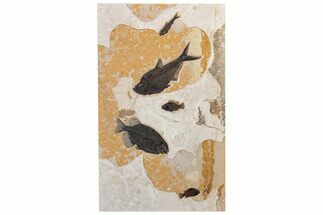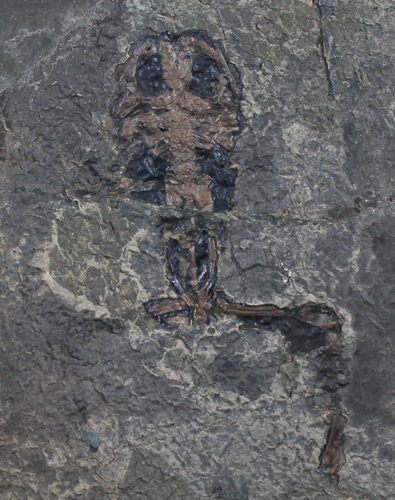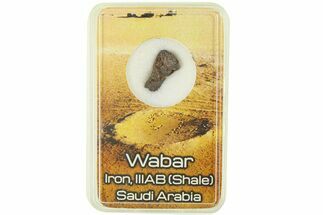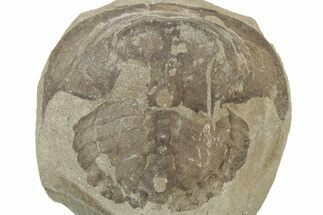This Specimen has been sold.
Rare Fossil Frog (Eopelobates) - Messel Shales In Germany
This specimen was just acquired from one of our suppliers. We won't have it back in our warehouse to ship until Sept. 18th It is on sale until this date, so if you purchase it quickly you get a discount :)
This is one of those very rare and unusual fossils, a fossil from (Eopelobates wagneri) from the Messel Oil Shales in Germany. The Messel Pit was declared a UNESCO World Heritage site in 1995 so the only material that is or will be available is coming from old collections.
The from itself is 5.3" long and while not complete shows a fair amount of detail. It was prepared using a classic resin transfer process. Since the oil shales the fossils at Messel are filled with water they would disintegrate if allowed to dry out. The rock as been compared to having the consistency of soggy cardboard. To collected the fossils, resin of poured over the top of them in the field to create a stable, artificial matrix. Then the fossil is removed and prepared from the other side, leaving the fossil embedded in a plate of hardened resin.
The Messel Shales represent a 47 million year old lake bed that was surrounded by a lush sub-tropical forest that harbored and incredible diversity of life. The slow, anoxic deposition of mud on the lake bottom created an environment for incredible fossil preservation.
These shales started to be commercially mined to produce oil in the 1850's until the 1970's when commercial mining ceased for economic reasons. For a several year period in the 1970's the site was open to fossil collecting. The site was purchased by the state in 1991 and declared a UNESCO site in 1995 due to the incredible fossil preservation. Since that time it has been transformed into a tourist destination and collection is strictly limited to academic collecting.
This is one of those very rare and unusual fossils, a fossil from (Eopelobates wagneri) from the Messel Oil Shales in Germany. The Messel Pit was declared a UNESCO World Heritage site in 1995 so the only material that is or will be available is coming from old collections.
The from itself is 5.3" long and while not complete shows a fair amount of detail. It was prepared using a classic resin transfer process. Since the oil shales the fossils at Messel are filled with water they would disintegrate if allowed to dry out. The rock as been compared to having the consistency of soggy cardboard. To collected the fossils, resin of poured over the top of them in the field to create a stable, artificial matrix. Then the fossil is removed and prepared from the other side, leaving the fossil embedded in a plate of hardened resin.
The Messel Shales represent a 47 million year old lake bed that was surrounded by a lush sub-tropical forest that harbored and incredible diversity of life. The slow, anoxic deposition of mud on the lake bottom created an environment for incredible fossil preservation.
These shales started to be commercially mined to produce oil in the 1850's until the 1970's when commercial mining ceased for economic reasons. For a several year period in the 1970's the site was open to fossil collecting. The site was purchased by the state in 1991 and declared a UNESCO site in 1995 due to the incredible fossil preservation. Since that time it has been transformed into a tourist destination and collection is strictly limited to academic collecting.
SPECIES
Eopelobates wagneri
LOCATION
Messel Pit, Messel, Germany
FORMATION
Messel Oil Shale
SIZE
Frog 5.3" long, Matrix 8.3x6.3"
CATEGORY
ITEM
#31431
We guarantee the authenticity of all of our specimens.
 Reviews
Reviews











